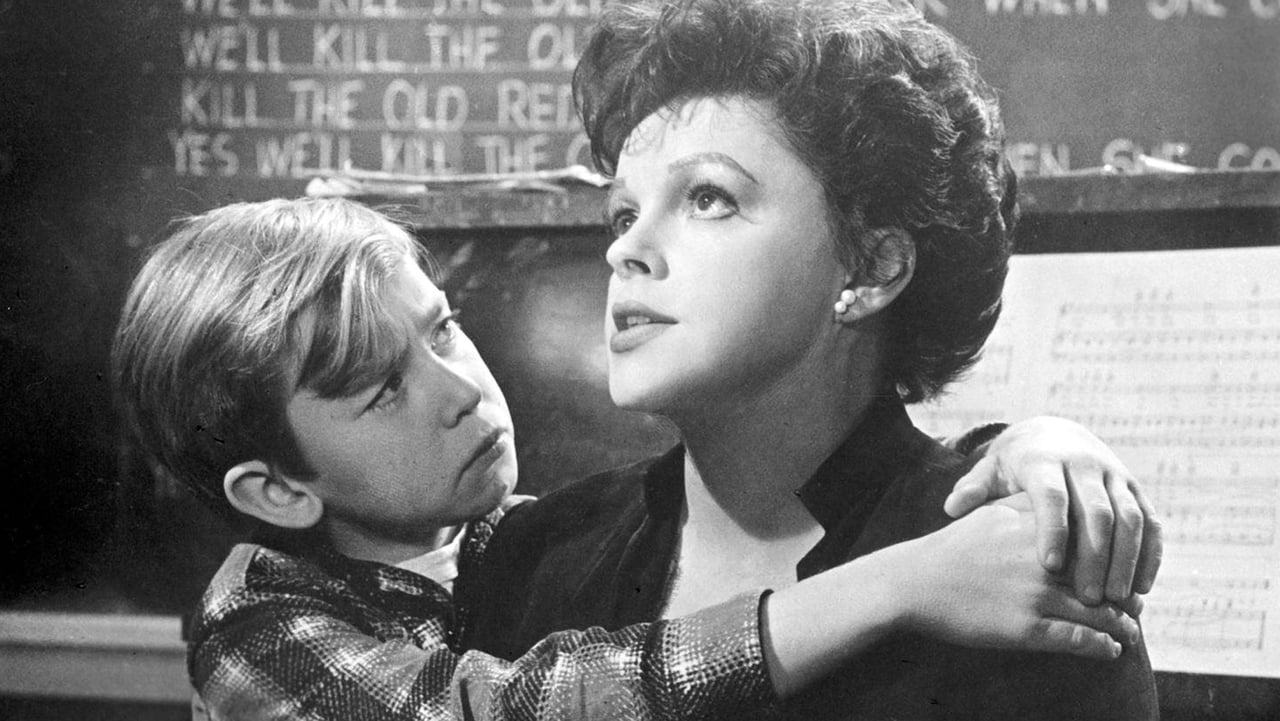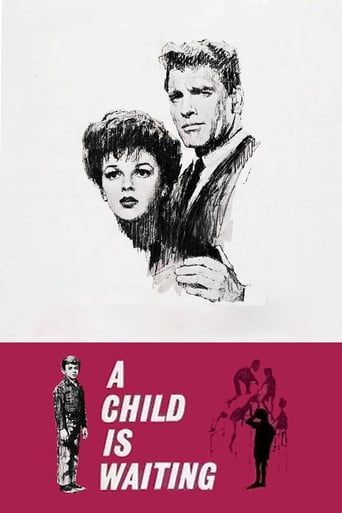SoftInloveRox
Horrible, fascist and poorly acted
MamaGravity
good back-story, and good acting
BroadcastChic
Excellent, a Must See
StyleSk8r
At first rather annoying in its heavy emphasis on reenactments, this movie ultimately proves fascinating, simply because the complicated, highly dramatic tale it tells still almost defies belief.
ElMaruecan82
"What does normal mean, anyway? He might be a bit on the slow side, but my boy Forrest is going to get the same opportunities as everyone else. He's not going to some special school to learn to how to re-tread tires." Now, who would have thought a movie was made that could enlighten us about the kind of destiny little Forrest escaped from thanks to his mother's iron-clad determination."A Child is Waiting" is set in a mental institution for troubled and emotionally disturbed children, and directed by John Cassavetes. It was his third movie following "Shadows" and "Too Late Blues", but didn't have the same impact and was inevitably overshadowed by his more revolutionary "Faces", "Husbands", you know, typical Cassavetes. The film might be a little too 'classic' and structured but the independent movies' pioneer has never been a structured storyteller anyway; his sense of structure was of emotions and instincts.And I guess I could see why, of all the directors, he was selected for such 'heavy' material. The documentary-like aspect of "A Child is Waiting" calls for an eye that already proved its acuteness to spot the vulnerability of the human soul without the use of cinematic tricks. The film renders with more or less efficiency the harrowing pain and discomfort the spectacle of mental handicap can inspire, with shades of optimism carried by these kids' smiles and attempts to learn. Made in 1963, it is as modern as if it dealt with today's kids. The opening credits show children's drawings and we can see they don't differ much from what kids born in the 2000's would draw.But all these efforts to hit a universally and timelessly sensitive chord can't distract from the fact that the film was a box-office failure.This is a movie whose making was unfortunately derailed by a growing antagonism between producer Stanley Kramer and Cassavetes. And by starring Burt Lancaster as the director of the institution, Dr. Clark, Judy Garland as Jean Hansen, the newly hired teacher and the screenplay being written by Abby Mann, the film is torn between the didacticism of "Judgment by Nuremberg" and the emotionality of "Faces". Cassavetes disowned it, Kramer wished they could have transcended that barrier of disagreement for the sake of that profound and haunting issue. As much as a Cassavetes' fan I consider myself, I appreciate the point made by Kramer. This is a film too important to be disregarded because of cinematic considerations.Cassavetes has a point though. There are some elements that are overly dramatized and seem to be just made in order to extract the "right" emotions from us, Clark's heroic stand-up against the patronizing compassion of doctors and politicians who consider these kids as abnormal, or Hansen' misty-eyed compassion toward little Reuben. The acting is obviously well-intentioned and I can see sincerity in the way Lancaster and Garland approach their roles. Yet the film is never as powerful as when it just lets the camera roll and shows the kids acting normally within their abnormality. I've seen child acting in old movies and this film contains one of the greatest ever. In a film like "The Night of the Hunter", children play a pivotal role but they fail to convince you, here, maybe the mental condition works because the kids are playful or disillusioned, thus naturally indifferent to the camera eye.To some extent, the film reminded me of the movie "Freaks" in the sense that the protagonists were playing their roles and never really tried to act, to the point that they were deemed as freaks from the perspective of society but never the eye of Todd Browning or the viewers. Cassavetes achieves the same thing, when the kids try to 'play the game', it's less from the awareness that there's a camera, but because most of these kids really want to please the adults and overcome their handicap. But they're still confronted to the severe judgment of adults, parents and society, that's their tragedy, they're dependent on people's perceptions, even positive ones. We all do but at least, we have the privilege of reciprocity. Cassavetes tried to free the kids from that burden but his personal vision was contradicted by Kramer's: that discipline was the only way to shield these kids. And the soul of this conflict is Reuben who refuses to get off the car in the opening sequence.I don't know if the kid was really troubled or not, but he is in a worse condition because unlike some kids, he "looks" normal, so as the doctor said, he might be more likely to face rejection. Reuben also grows a fondness on Mrs. Hansen which he sees like a second mother and she's caught in a situation where she's tempted to become a loving model but then decides to call his mother played by Gena Rowlands. Rowlands, Cassavetes' wife and muse elevates the film through her five-minute monologue about guilt poisoning a mother's heart when she decides to leave her child. The problem isn't about love, whatever it is, sooner or later, love is compromised and the kid is lost anyway. In a way, she proves Clark's point about the necessity of an institution, the lesser of two evils.Which takes me back to that shift between Kramer and Cassavetes, it is quite interesting, it's like the film reflected its own polarizing subject, I don't think I would agree that these kids could grow normal without the help of adults and a mental structure, but again, Cassavetes works through emotions, and with his sharp filmmaking, manages to elicit powerful performances from these children. The film is never as good as when it deals with emotional rather than trying to be too preachy for its own good. The point it tries to make is honorable, but the camera of Cassavetes handles the hardest part.
usersince03
I recently watched most of this film on sky TV. Being a fan of Judy Garland I wasn't particularly keen on this film. The thing that bothered me was the parents of the young boy Reuben who was in the home never bothered to visit him, until the end when the Dad watches his play. In the film the doctor tells the father that Reuben is retarded, I'm no doctor but I don't believe he was any way retarded. I think he had autism. Doctors don't always get the diagnosis right, most people with autism don't get diagnosed right away. The one scene that bothered me was the Mother of Reuben played by Gena Rowlands telling Jean (Judy Garland) that she would have to hide Reuben when her friends come.
meg23
This is film I could never think to forget. Every moment, every interaction is saturated with meaning and force, and the whole is a beautiful tribute to people living with mental retardation and those dedicated people who work with them. Judy Garland's performance is candid, human, and wonderfully real, and it is one of the pillars on which the movie stands. Burt Lancaster is a great actor, who, of course, does a great job, too. Abby Mann's dialog is, as always, gloriously real and bares all emotion, however painful. This is certainly a movie to watch with tissue-box in hand. I wish I had had a tissue, and my poor, wet sleeve must wish it, too!
Neil Doyle
JUDY GARLAND, as a naive music teacher looking for more fulfillment in a job that helps retarded children, and BURT LANCASTER as the head of the school for such youngsters, are the principal reason for watching this movie. Garland gives a very sincere, unaffected performance of the woman who eventually clashes with Lancaster when her coddling of a favorite student is deemed an inappropriate way to deal with his handicap.Directed by John Cassavetes, this has an almost documentary feel to it as we meet the retarded and see how the staff is dealing with them. As scripted by Abby Mann, it's a sensitive study of an unusual theme and has been given a tremulous but low-key performance from Garland, one of her better mature roles and one that shows what an admirable actress she could be. As the stern taskmaster, Lancaster too never lets down his share of the acting requirements, being completely believable and authoritative in all of his scenes.A bit slow-moving, but worth your attention for its sincere attempt to tell a heart-warming story.

